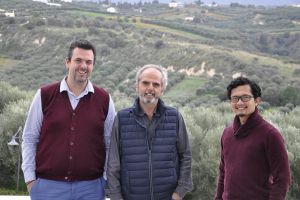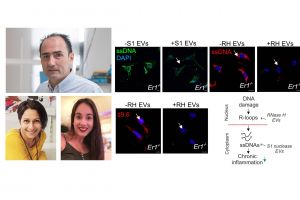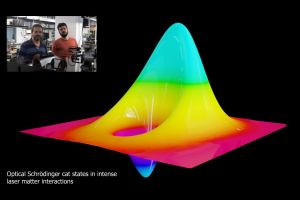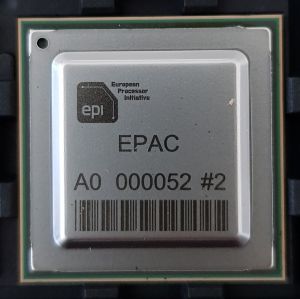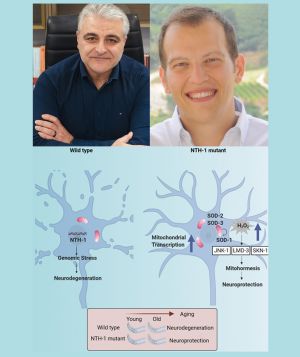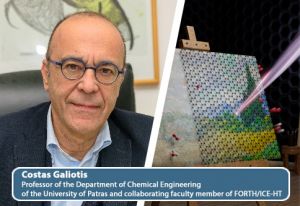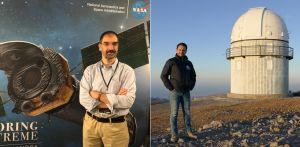Research Highlights
Significant ERC funding awarded to FORTH postdoctoral researcher at the Institute of Astrophysics
Dr. Carolina Casadio, Postdoctoral Researcher at the Institute of Astrophysics - FORTH, has been awarded a highly competitive European Research Council (ERC) Starting Grant to study the nature of Dark Matter.
Protein structural dynamics underlie their evolution and adaptability over the centuries
How does nature utilize the common repertoire of folds in proteins to differentiate their specificity, and ultimately their function? This long-standing and fundamental question was addressed in a study conducted at the Institute of Molecular Biology and Biotechnology of the Foundation for Research & Technology-Hellas (FORTH-IMBB).
IMBB researchers reveal that DNA damage in tissue-infiltrating macrophages triggers an exosome-based metabolic reprogramming leading to chronic inflammation.
Research carried out at the Institute of Molecular Biology and Biotechnology (IMBB) of FORTH, provides evidence that persistent DNA damage triggers an exosome-based, metabolic reprogramming that leads to chronic inflammation and tissue pathology in DNA repair-deficient progeroid syndromes and likely also during aging.
"Generation of optical Schrödinger “cat” states in intense laser-matter interactions" was published in Nature Physics.
In a theoretical and experimental study published in Nature Physics, an international team of researchers led by Prof. Maciej Lewenstein (ICFO -Spain) and Dr. Paraskevas Tzallas (FORTH-Greece), demonstrates the generation of highly non-classical states of light in intense laser–atom interactions.
Experimental campaign of atmospheric measurements in the framework of the Cloud-AerosoL InteractionS program in the Helmos background TropOsphere (CALISHTO)
The Cloud-AerosoL InteractionS measurement campaign in the Helmos background TropOsphere (CALISHTO) is taking place in the next two months (October-November 2021) in the context of PANACEA infrastructure and the ERC program PyroTRACH.
"Hello World!" : The first test chip of the European RISC-V Processor came to life in Heraklion, Crete
Four awards for the Institute of Computer Science of FORTH for its contribution in the field of Health
The innovative activities of the Institute of Computer Science (ICS) of the Foundation for Research and Technology - Hellas (FORTH) were awarded for the third consecutive year by the HealthCare Business Awards at the award ceremony held on Monday, September 20, 2021 in Pallini.
Scientists uncover the role of DNA base excision repair in the pathogenesis of Parkinsonʼs disease
The findings of the study, published today in the premier international scientific journal Cell Reports, reveal a novel molecular mechanism underlying the detrimental effects of BER imbalance in the pathogenesis of Parkinson’s disease.
The pioneering idea of using graphene for the protection of paintings, paving the way for the development of novel methods in art preservation and restoration, has been published on 1.7.21, in Nature Nanotechnology.
A team of researchers from the Institute of Chemical Engineering Sciences of Foundation for Research and Technology-Hellas (FORTH/ ICE-HT), the Department of Chemical Engineering of the University of Patras, and the Center for Colloid and Surface Science (CSGI) of the University of Florence, led by Professor Costas Galiotis, had the innovative ideato use graphene veils for the protection of paintings against environmental degradation.
Less metals, more X-rays!
A recent article published in the Monthly Notices of the Royal Astronomical Society, led by Dr. Kostas Kouroumpatzakis, of the Institute of Astrophysics at the Foundation for Research and Technology, Hellas (IA-FORTH), and the University of Crete, provides new insights into the connection between the X-ray luminosity of accreting black holes and neutron stars and the composition of the stellar populations they are associated with.
Page:1 .... 2345678910 | < Prev Next >


